Come to the second floor hallway of CLP-Main! On view is an exhibit called “Finding Your Voice – The Many Mediums of Expression.” The exhibit includes three prominent figures of Pittsburgh’s musical history; Ethelbert Nevin, Josie Carey and David Stock.
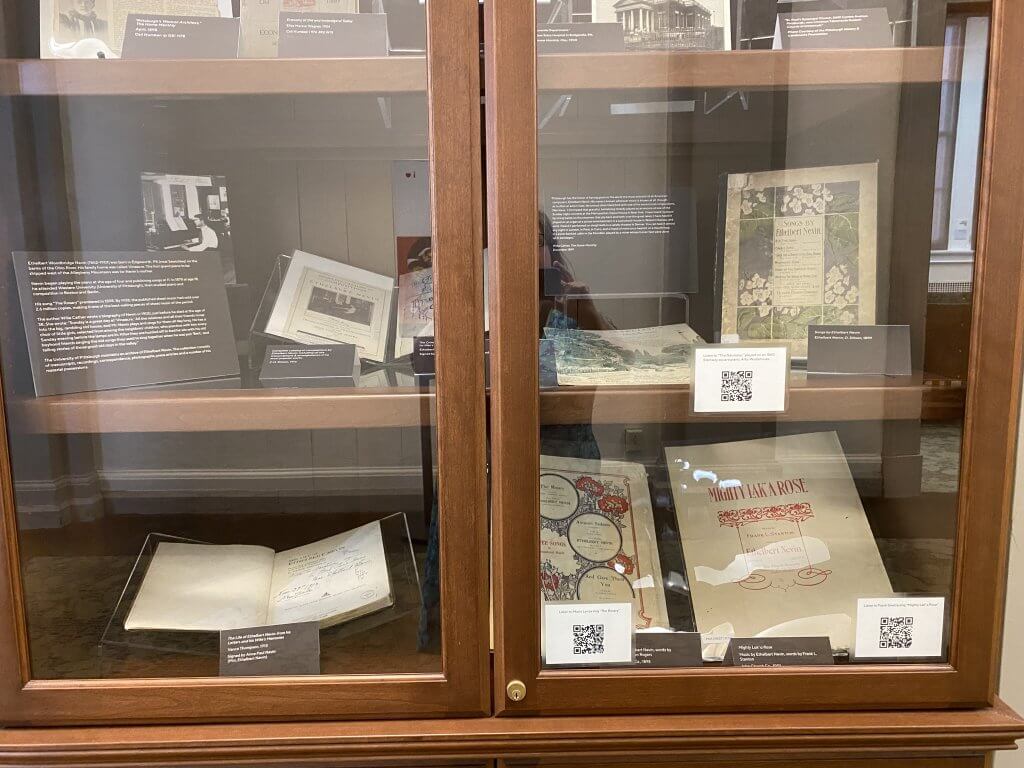
Ethelbert Woodbridge Nevin (1862-1901) was born in Edgeworth, PA (near Sewickley) on the banks of the Ohio River. His family home was called Vineacre. The first grand piano to be shipped west of the Allegheny Mountains was for Nevin’s mother.
Nevin began playing the piano at the age of four and began publishing songs at eleven. In 1878 at age 18, he attended Western University (University of Pittsburgh), then studied piano and composition in Boston and Berlin.
His song “The Rosary” premiered in 1898. By 1928, the published sheet music had sold over 2.6 million copies, making it one of the best-selling pieces of sheet music of the period.
The author Willa Cather wrote a biography of his life in 1900, just before he died at the age of 38. She wrote: “Sunday is a great day at Vineacre.’ All the relatives and all their friends troop into the big, rambling old house, and Mr. Nevin plays and sings for them all day long. He has a choir of little girls, selected from among the neighbors’ children, who practice with him every Sunday evening before the lamps are lit. After they are hustled off to bed he sits with his old boyhood friends singing the old songs they used to sing together when he was just ‘Bert,’ and telling stories of those good old days in the valley.”
The University of Pittsburgh maintains an archive of Ethelbert Nevin. The collection consists of manuscripts, recordings, correspondence, photographs, press articles and a number of his material possessions.
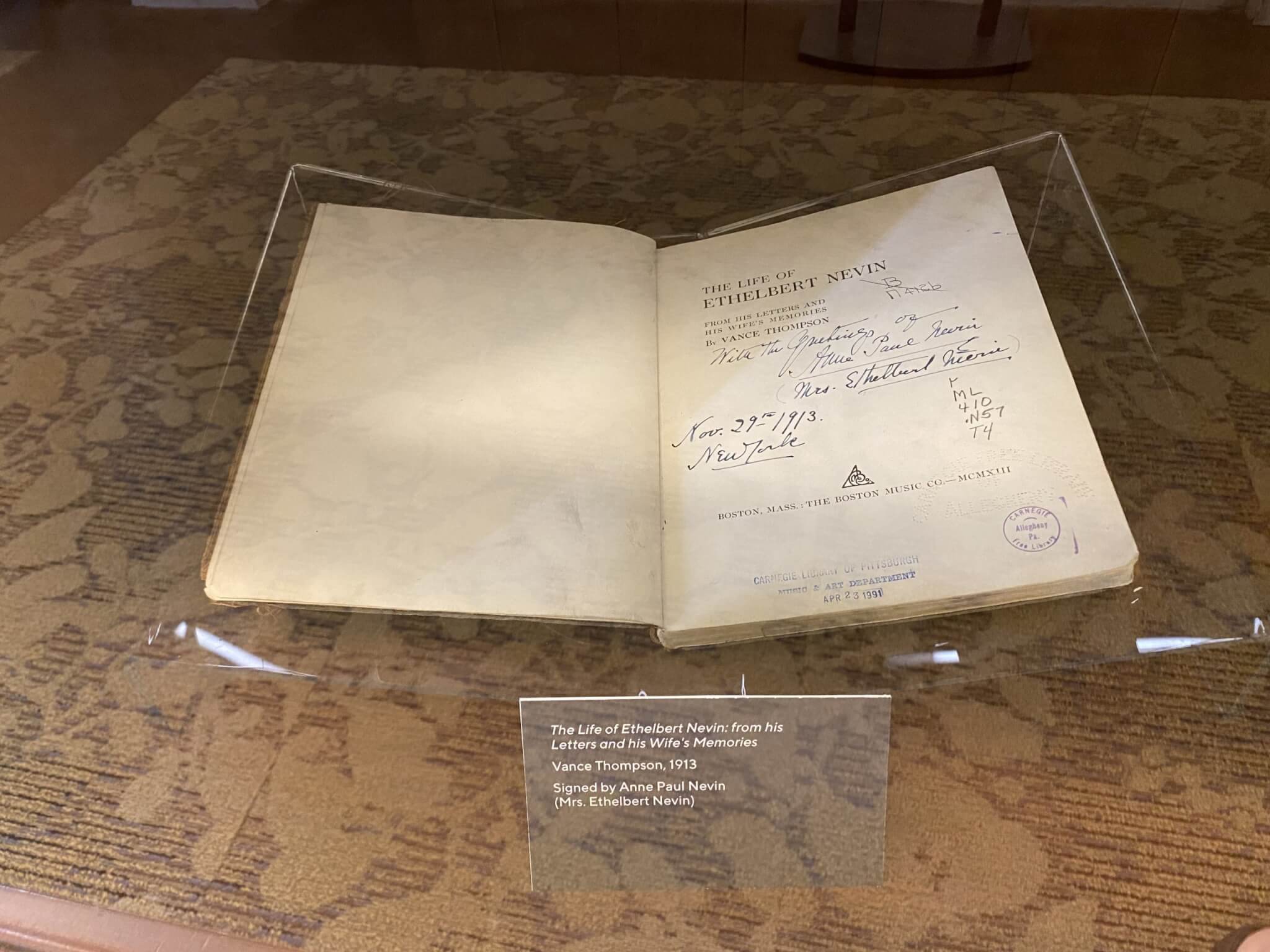
Willa Cather’s Tribute to Ethelbert Nevin:
“Pittsburgh has the honor of having given to the world the most eminent of all American composers, Ethelbert Nevin. His name is known wherever music is known at all, though, as is often an artist’s fate, he is most often identified with one of his more trivial compositions, ‘Narcissus.’ I first heard that graceful, tantalizing melody played as an encore at one of the Sunday night concerts at the Metropolitan Opera House in New York. I have heard it played by string bands on the steamers that ply back and forth over the great lakes; I have heard it played on an organ at a school entertainment in a sod school-house in Western Kansas, and once I heard it performed on sleigh bells in a variety theater in Denver. You can hear it almost any night in London, in Paris, in Cairo, and a friend of mine once heard it on a mouth harp in a snow-banked cabin in the Klondike, played by a miner whose frozen feet were done up in bandages.” – Willa Cather, The Home Monthly, 9 (December 1899).
- Listen to Frank Sinatra sing “Mighty Lak’ a Rose.”
- Listen to Mario Lanza sing “The Rosary.”
- Listen to “The Narcissus” played on an 1860 Steinway square piano. Artis Wodehouse pianist.
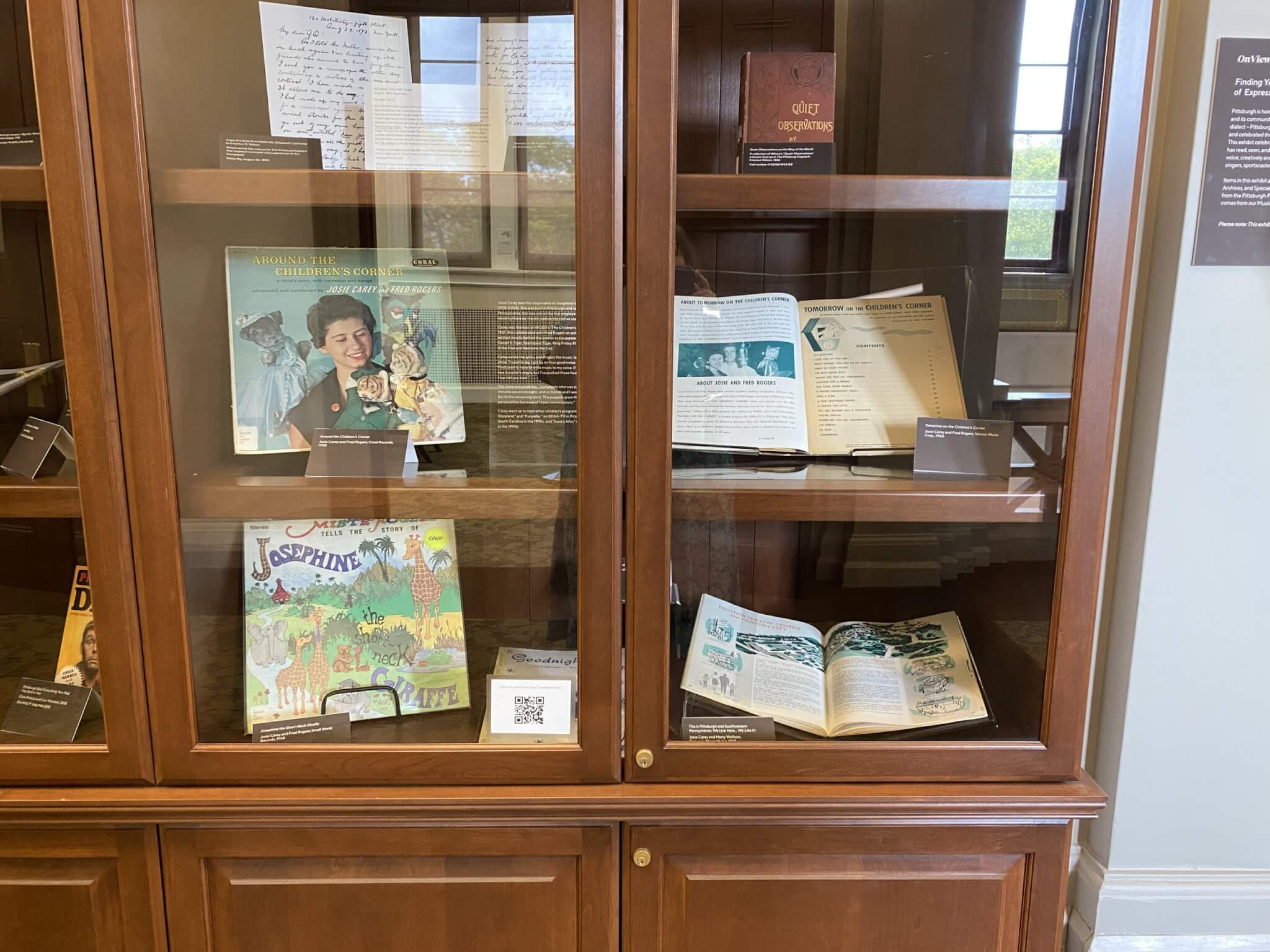
Josie Carey was the stage name of Josephine Vicari Massucci Franz (1931-2004). She was born in Pittsburgh and raised in Butler, Pennsylvania. She was one of the first employees of WQED Pittsburgh, working there six months before the station started broadcasting.
Carey was the host of WQED’s “The Children’s Corner” from 1953 to 1961. Carey collaborated with Fred Rogers on scripts and music. Rogers worked mostly behind the scenes as a puppeteer. The puppets included Daniel S. Tiger, Grandpère Tiger, King Friday XIII, Queen Sara Saturday, X the Owl and Henrietta the Cat.
Carey wrote the lyrics, and Rogers the music, to 68 songs used in the show. “I used to say I got by on four good notes and a smile,” Carey said. “Fred used to have to write music to my voice. If he went too high or too low, I couldn’t sing it, but I’ve pushed those four good notes a long way, I can tell you that.”
The show was aired live. “Somebody who was supposed to do 10 minutes would do eight, and so Daniel and I would talk to each other [to fill the remaining time]. The puppets grew that way. They became personalities because of these conversations.”
Carey went on to host other children’s programming, including “Josie’s Storyland” and “Funsville,” on KDKA-TV in Pittsburgh, “Wheee!” in South Carolina in the 1970s, and “Josie’s Attic” on WQEX Pittsburgh in the 1990s.
- Listen to Josie Carey sing “Goodnight God.”
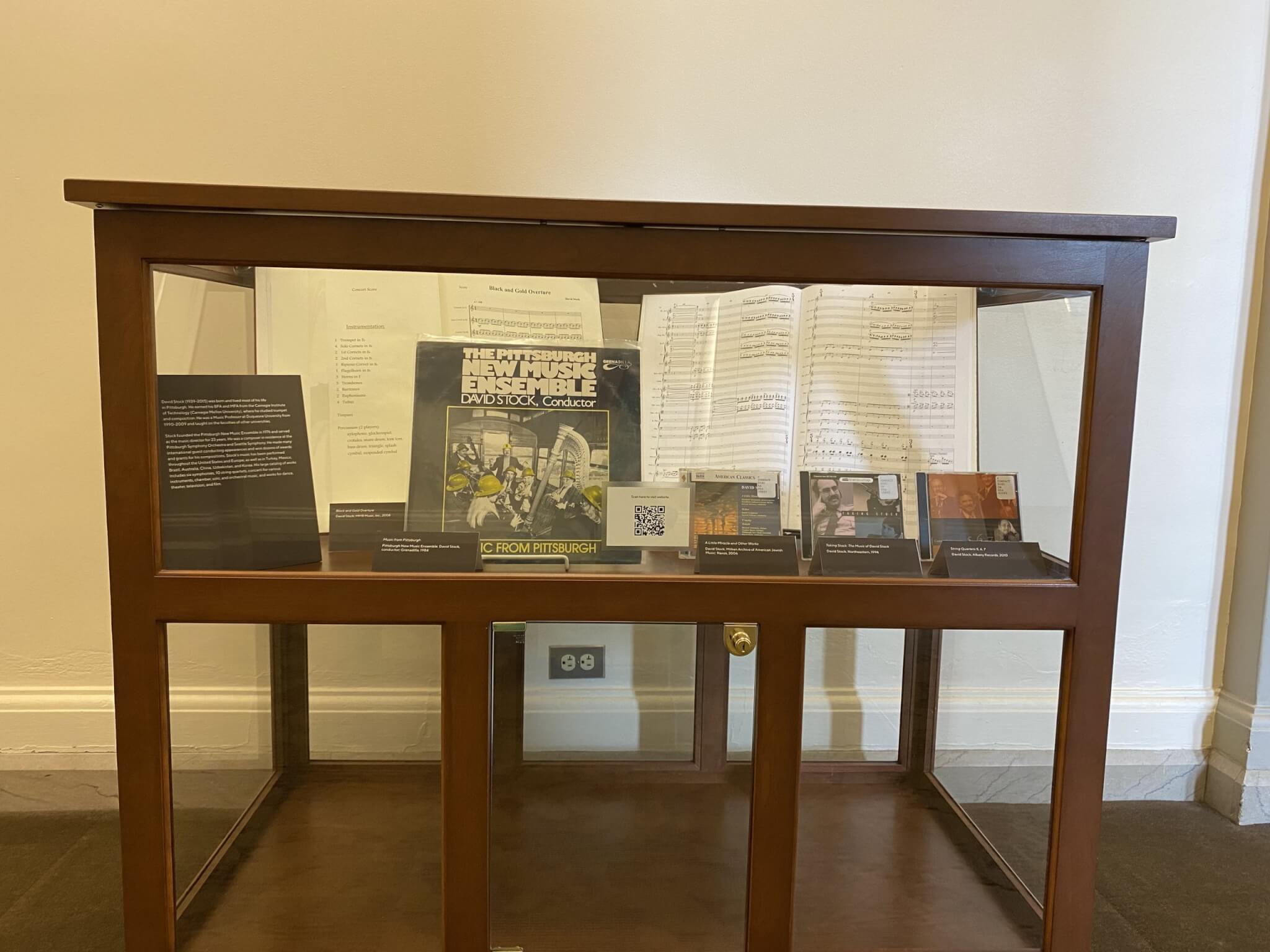
David Stock (1939-2015) was born and lived most of his life in Pittsburgh. He earned his BFA and MFA from the Carnegie Institute of Technology (Carnegie Mellon University), where he studied trumpet and composition. He was a Music Professor at Duquesne University from 1990-2009 and taught on the faculties of other universities.
Stock founded the Pittsburgh New Music Ensemble in 1976 and served as the music director for 23 years. He was a composer in residence at the Pittsburgh Symphony Orchestra and Seattle Symphony. He made many international guest conducting appearances and won dozens of awards and grants for his compositions. Stock’s music has been performed throughout the United States and Europe, as well as in Turkey, Mexico, Brazil, Australia, China, Uzbekistan, and Korea. His large catalog of works includes six symphonies, ten string quartets, concerti for various instruments, chamber, solo, and orchestral music, and works for dance, theater, television, and film.
- View David Stock’s website.
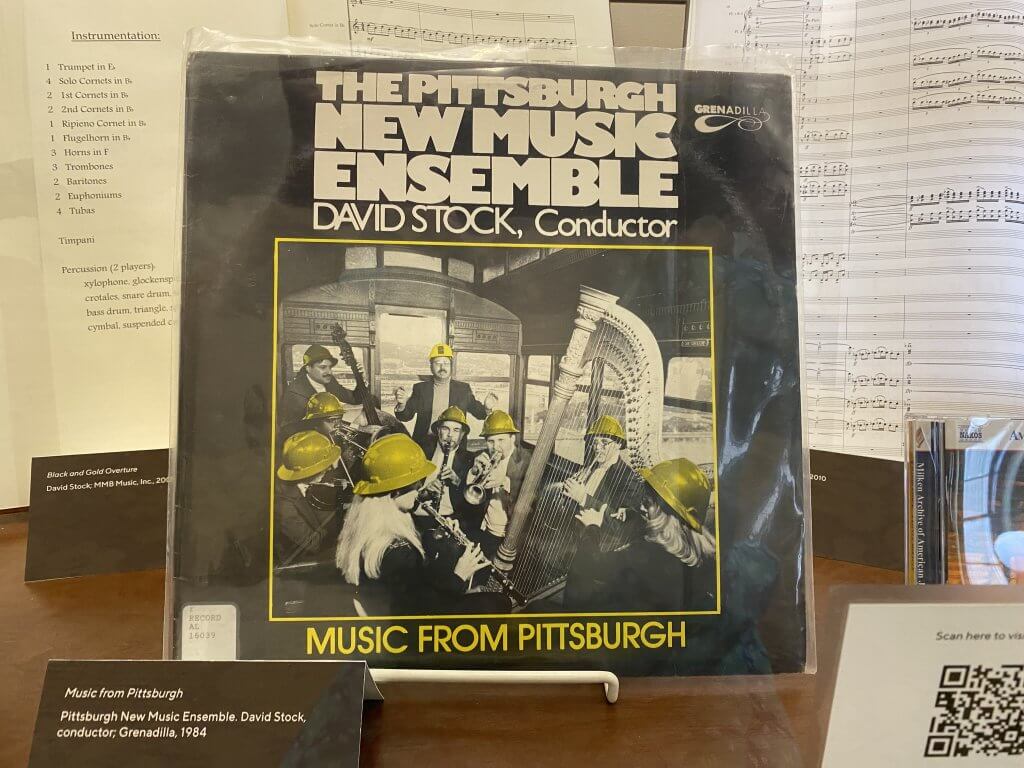
Please take a moment while visiting our exhibit to jot down and share your own stories in the provided journals on small tables in the hallway.

